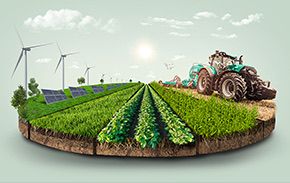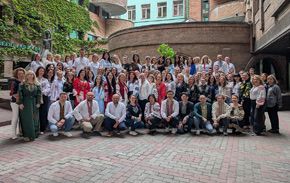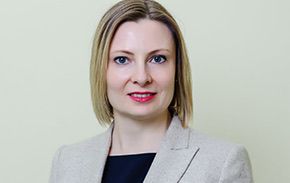We have found a common language with our customers
HOW DOES INTERNATIONAL GROUP CREDIT AGRICOLE AND ITS UKRAINIAN SUBSIDIARY LOOK LIKE TODAY?
The Group is operating in more than 50 countries of the world, including Ukraine.
On November 19, 2013 we have merged two legal entities which were previously active in Ukrainian market: CREDIT AGRICOLE CIB and CREDIT AGRICOLE BANK (former INDEXBANK). CREDIT AGRICOLE BANK had historically worked with retail, small and medium business, as well as Ukrainian corporate business. Credit Agricole CIB was focused on international companies working in Ukraine. Now we can meet the requirements of all customer segments: from private individuals to international corporations. We use different approaches for all categories of customers and we have different sets of offers.
HOW WOULD YOU CHARACTERIZE THE DYNAMICS OF DEMAND FOR YOUR PRODUCTS FROM AGRICULTURAL PRODUCERS DURING THE LAST COUPLE OF YEARS?
We have been pursuing the agricultural line in lending only since 2009.
We had to start from scratch as we did not have such loans in our portfolio at all. Then every year the volume of lending to agricultural sector grew by 30% and in the nearest future we expect the level of agrarian loans in our legal entity loan portfolio to reach 40%. As of mid-April this year loans to legal entity agrarians in our portfolio made 1 billion 800 thousand UAH but the season is not over yet. Last year we have crossed the threshold of 2 billion UAH and I believe that this year the figure will be as large. Our active lending period is in April, May, June and also harvesting season. After the end of the season we offer stock-financing, which is financing of warehouse stock against collected harvest. In general, we provide funding for the whole chain: from production to processing, and also trading.
If we talk about trends, in recent years small and medium business has higher demand for medium-term financing for the purchase of agricultural equipment. As a rule, these are three-year loans for the purchase of one or two harvesters. We are actively developing partnership programs in conjunction with the manufacturers of agricultural equipment and their dealers. In corporate business segment we observe increased demand for financing of construction of elevators. Processers are also interested in renewal of fixed assets and production lines. More and more Ukrainian corporate customers use our documentary instruments. For the last two years in autumn hryvnia was virtually absent on the market. What can be offered in this case? Documentary instruments – discounted letters of credit, banking guarantees or promissory notes. Documentary financing is always cheaper than the direct one, especially under the internal tariffs of Credit Agricole group. Here I would like to underline the synergy of banks of Credit Agricole group in different countries. For example, we are a good partner of our Italian counterpart Cariparma Friuladria: it is operating in the north of Italy - home to many producers of equipment for foodstuff industry. For the second year in a row we are offering avalized bills, enabling agricultural producers to pay for seeds and plant protection agents with deferment of payment. The cost of such bill is 4-5% per annum which is four times cheaper compared with the regular financing in hryvnia. For the distributors of plant protection agents and seeds the similar instrument is banking guarantee, the cost of which is also only 4-5% per annum. This instrument is of high demand, which is constantly growing. Last year we signed an agreement with Bayer and International Finance Corporation, the other producers of plant protection agents also demonstrated interest.
DO YOU HAVE ANY PARTNERSHIP PROGRAMS WITH UKRAINIAN PRODUCERS OF RESOURCES FOR AGRICULTURE?
Yes, for instance, with Karlivskyi Machine Building Plant we make agreements on financing of equipment and, due to joint efforts of the partners, it is by 5% p.a. cheaper for the buyer. Average rate in the market exceeds 20%, but when one partner reduces it by 2 percentage points, and the other one – by 3, the loan received as a result is cheaper.
WHAT, IN YOUR OPINION, IS A LONG-TERM LOAN? WHAT IS THE PERIOD OF SUCH LOAN, WHAT ARE ITS TERMS AND VOLUMES?
We consider a loan granted for 5-7 years a long-term one. As a rule, these are funds for large-scale projects, such as renewal of fixed assets of a processor, construction of elevators, etc. The size of the loan depends on a particular project. We look at what this loan will provide in the end and how company plans its development with its help. There is no universal recipe. With some companies we make projects for 5 million UAH, with others – for 15 million EUR.
VERY OFTEN AGRARIANS COMPLAIN ABOUT THE LACK OF COLLATERAL THE BANKS REQUEST FOR A LOAN TO BE GRANTED. WHAT COLLATERALS DO YOU REQUEST?
We are trying to use integrated approach here. We do not have any strict rules like 100% loan coverage with hard collateral or no money for you. If needed, solution can be found.
The most common collateral is represented by fixed assets – tractors, harvesters, warehouses, processing lines. It may also be owner’s property; very often when cooperating with us the owners have property guarantees in the form of houses, cars. Some of them offer their personal deposits. We take future harvest as part of total collateral. Or property rights to future receipts if we know that the company our customer is cooperating with is reliable and will make its autumn payment in time. For example, a farmer starts growing potatoes for Craft Foods Company, payment for which will be received in October or November. If this farmer lacks collateral for a loan, we accept property rights to future receipts and thus form our credit position. If the owner is ready to provide his surety, we only welcome that. Because if the owner believes in his business, then the bank has more reasons to believe that the loan will be repaid in time.
HOW STABLE IS THE GROUP OF YOUR CUSTOMERS?
There is certain stability. But right now we are at the stage of active growth, so new enterprises are coming to us. While the majority of companies that started working with us 3-4 years ago are, fortunately, still with us. They really value the fact that the bank is trying to speak a common language with its customers. If at the beginning the total number of agrarian university graduates among our staff was about five people, today, after active trainings, specialists who talk with customers already know what to ask. And companies value this. We have experts in the field of economy, credit specialists, market managers, as well as experts in veterinary medicine, crop growing, including those holding degrees from French universities. We have a lot of customers and it is impossible to visit all of them in person from Kiev, but anyway we try to make field trips to the majority of companies to observe and to communicate. We look at the way the company manages risks, to whom it sells its harvest, whether it has sufficient storage facilities. And, having an idea about financial realities of the company, we pay a lot of attention to the potential it has in opinion of the experts, too. This is not a classic banking because having come to the village you need to understand what is being said.
DO YOU HAVE ENOUGH FINANCIAL RESOURCES?
Situation with financing is good. For the last two years liquidity crises occurred in the fall, while in spring there is enough cash. If we speak about the cost of hryvnia, it has seen some reduction – to 19-22%. Some companies even receive compensation, though in reality only few of our customers said that they managed to receive compensation of interest rates from the state. So agrarians mostly rely on themselves and on what is being proposed by the banks. In our case these are documentary instruments used to reduce cost for at least some part of its loan portfolio or partnership programs, where we also manage to make a 1-2% and sometimes even 5% reduction.
IT IS SPRING NOW, FIELD WORKS ARE IN PROGRESS. YOU OBVIOUSLY HAVE A VERY BUSY LENDING SEASON NOW. WHAT ARE THE PREOCCUPATIONS OF CREDIT AGRICOLE BANK FOR THE MOMENT?
Of course, it is difficult for the managers, they have to stay late and work on weekends, but we have been working this way during this period for four years now. We have 207 points of sale all over Ukraine and a lot of specialists: almost 150 in front office, plus outlet managers, they have already become specialists in agriculture as well. Traditionally our portfolio is divided between crop growing and cattle breeding 80% to 20% respectively. Short and long seasonal loans in small and medium business make about 60% of our total portfolio, 20% fall for medium-term loans that are generally taken to purchase equipment, while the rest are documentary instruments. In corporate segment almost 85% is represented by seasonal financing, while loans for equipment or promissory notes are fewer.
WHAT DO YOU DO IN CASES WHEN THE CUSTOMER IS NOT ABLE TO REPAY RECEIVED LOAN?
We have very large agricultural portfolio. I can remember only few situations when companies were facing difficulties but it never went as far as enforcement of collateral. The reasons behind those difficulties were completely adequate: for instance, last year southern regions suffered greatly as a result of a draught and there was no harvest at all. But with the small number of companies that were not able to repay the loan we negotiated loan restructuring and not collateral enforcement. Nevertheless, hypothetically, seeing that we are working with all the largest traders in Ukraine, selling confiscated harvest would not be much of a problem. But let’s hope we would not have to resort to that.
AS PER YOUR ESTIMATIONS, HOW POLITICAL FORCE-MAJEURE EVENTS IN UKRAINE AFFECT THE INTEREST RATE?
These are not so much political force-majeure events as, I would say, permanent devaluation expectations, when people are trying to convert hryvnia into dollars and, in the best-case scenario, leave it at the bank, while in the worst – take it away completely and keep it at home. Of course, such extractions of hryvnia result in rising of its cost or even disappearance. To retain hryvnia, the banks increase rates on deposits: for two years in a row in autumn we have already seen 22-24% rates. Under such circumstances any bank in order to survive will be forced to increase prices of credit resources. This instability in our society has an adverse impact, first and foremost, on availability of cash and its price. For two consecutive years we have seen prices going up in autumn but, fortunately, before the beginning of the season the situation stabilizes, hryvnia reappears in the market and deposit rates fall, thus enabling us to offer something more or less affordable for agrarians.
A LOT OF BANKS FORM THE FOLLOWING TRIAD: CREDIT INSTITUTION, LEASING COMPANY, INSURANCE COMPANY…
Credit Agricole group does have both leasing and insurance companies. Maybe in the future they will make their way to Ukraine as well, but it depends on numerous factors: country’s development, its prospects, economic and political stability. The group is pursuing this line of activity, but for now in Ukraine we are focusing purely on banking.

 Useful information
Useful information
 Useful information
Useful information
 Useful information
Useful information
 Useful information
Useful information
 Useful information
Useful information
 Useful information
Useful information
 Useful information
Useful information
 Useful information
Useful information
 Useful information
Useful information
 Useful information
Useful information
 Useful information
Useful information
 Useful information
Useful information
 Useful information
Useful information
 Useful information
Useful information
 Useful information
Useful information






